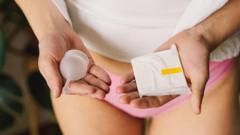Which Period Product is Right for You?

Published: 2025-09-23 23:05:16 | Category: technology
Understanding menstrual products can be daunting, especially with the plethora of options available today. From traditional pads and tampons to innovative reusable alternatives like menstrual cups, period pants, and washable pads, each product serves a unique purpose. This article explores how these menstrual products function and outlines their respective pros and cons to help you make an informed choice.
Last updated: 02 October 2023 (BST)
Key Takeaways
- Menstrual cups collect blood rather than absorb it.
- Period pants offer built-in absorbency and are reusable.
- Reusable pads are eco-friendly alternatives to disposables.
- Disposable pads and tampons are widely used but less environmentally sustainable.
- Hygiene practices are crucial when using any menstrual product.
Menstrual Cups: A Flexible Choice
Menstrual cups are small, flexible cups made of medical-grade silicone designed to collect menstrual blood. To use a menstrual cup, you fold it, insert it into the vagina, and it sits comfortably to gather the flow without absorbing it. There are various types of cups available, catered to different flow intensities and whether you have given birth.
How to Use Menstrual Cups
Before inserting the cup, hygiene is paramount. Ensure you wash your hands thoroughly and clean the cup between uses. The cups can typically be worn for up to 12 hours, depending on the flow level.
Pros and Cons of Menstrual Cups
- Pros:
- Reusable and environmentally friendly.
- Cost-effective in the long run.
- Can be worn overnight without leaks.
- Available in various sizes and styles.
- Cons:
- Some may find them difficult to insert initially.
- Requires practice to find the right fit.
- Needs regular cleaning and maintenance.
Period Pants: Comfort Meets Functionality
Period pants are specially designed underwear that feature built-in absorbent layers. They can be worn like regular underwear and are particularly popular for lighter days or while sleeping. After use, they can be rinsed, washed, and dried for reuse.
Reliability of Period Pants
Dr Tempest mentions that leakage concerns are quite normal; however, most period pants are designed to be reliable. They include waterproof layers and odour-resistant linings to enhance comfort and security during wear.
Pros and Cons of Period Pants
- Pros:
- Convenient and easy to use.
- Comfortable and similar to regular underwear.
- Can be washed and reused, reducing waste.
- Cons:
- May not be suitable for heavy flows.
- Initial cost can be higher compared to disposables.
- Requires washing and drying after use.
Reusable Pads: An Eco-Friendly Alternative
Reusable pads are similar in appearance to disposable ones but are often made from more sustainable materials, like cotton or bamboo. They fasten around your underwear using poppers and can be washed and reused multiple times.
Using Reusable Pads
To maintain hygiene, rinse the pad after use, then wash it with your regular laundry. They can last several years with proper care, making them a cost-effective option over time.
Pros and Cons of Reusable Pads
- Pros:
- Environmentally friendly and biodegradable.
- Soft and comfortable against the skin.
- Cost-effective over time with proper care.
- Cons:
- Requires washing after use, which may be inconvenient for some.
- Initial investment can be higher than disposables.
- May not be suitable for very heavy flows without frequent changes.
Disposable Sanitary Pads: The Traditional Choice
Disposable pads are the most commonly used menstrual product. They adhere to your underwear, absorbing blood externally. Dr Tempest recommends changing pads every four to six hours, and never wearing them for more than eight hours to prevent skin irritation.
Pros and Cons of Disposable Pads
- Pros:
- Widely available and easy to use.
- Variety of sizes and absorbency levels available.
- No cleaning required—simply dispose of after use.
- Cons:
- Contributes to environmental waste.
- Can be less comfortable due to synthetic materials.
- Potential for skin irritation if not changed frequently.
Tampons: A Discreet Option
Tampons are another popular menstrual product that are inserted into the vagina to absorb blood before it exits the body. Dr Tempest stresses the importance of correct disposal, as many tampons are improperly flushed down toilets, contributing to plumbing issues.
Pros and Cons of Tampons
- Pros:
- Discreet and comfortable for many users.
- Available in various absorbency levels.
- Can be worn during physical activities and swimming.
- Cons:
- Risk of Toxic Shock Syndrome (TSS) if left in too long.
- Requires careful disposal to avoid environmental issues.
- May cause discomfort if not inserted correctly.
Making the Right Choice for You
Selecting the right menstrual product depends on various factors including flow intensity, lifestyle, and personal preferences. Understanding how each product works will help you decide which is best suited to your needs. It's also worth considering your environmental impact and the long-term costs associated with each choice.
Conclusion
Menstrual health products have evolved significantly, providing a range of options to suit different needs and lifestyles. Whether you opt for a menstrual cup, period pants, reusable pads, disposable pads, or tampons, the key is to find what works best for you. Prioritising comfort and hygiene will enhance your experience during your period, ensuring you feel secure and confident.
FAQs
What are menstrual cups made of?
Menstrual cups are typically made from medical-grade silicone, latex, or thermoplastic elastomer, which are safe materials for internal use.
How often should I change my menstrual products?
It is generally recommended to change sanitary pads every four to six hours, while menstrual cups can be worn for up to 12 hours, depending on flow.
Are period pants effective for heavy flows?
Period pants can be effective for light to moderate flows; however, for heavy days, they may need to be complemented with another product for added protection.
Can I swim while using a tampon?
Yes, tampons are designed for use during swimming and other physical activities, making them a discreet choice for those who want to stay active during their period.
How do I care for reusable pads?
Reusable pads should be rinsed immediately after use, then washed with your regular laundry. They can be air-dried or tumble dried according to the manufacturer's instructions.



